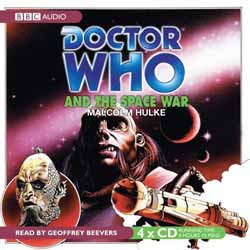|
Click here to return to the main site. Audio Book Review
“Doctor!” screamed Jo. “Look at that thing. It’s coming straight at us!” A small, black spaceship, about a mile away, was approaching rapidly. It had no lights, no markings. But some instinct told Jo that the tiny craft meant danger... The year is 2540, and two powers loom large in the galaxy: Earth and Draconia. After years of peace, their spaceships are now being mysteriously attacked and cargoes rifled. Each suspects the other and full-scale war seems unavoidable. The Doctor, accused of being a Draconian spy, is thrown into prison. And only when the Master appears on the scene do things really begin to move... I wonder what the author thought about the above synopsis when it first appeared on the back cover of the print version of this novelisation, originally published in 1976. The final sentence suggests that the plot doesn’t get going until after the Master has appeared, about halfway through the story. Fair enough, there is a lot of globe-trotting, space-hopping, getting captured and escaping in the runaround plot, which includes visits to Earth of the future, Draconia and the planet of the Ogrons, a short spell in a lunar prison and a spacewalk for the Doctor, and capture by the Master for Jo. Some critics regard Frontier in Space, the six-parter upon which this book is based, as merely a set-up for Planet of the Daleks, the serial that follows it. In these two stories, part of Doctor Who’s tenth anniversary season, the production team of the time attempted to match the duration and sheer scope of The Daleks’ Master Plan. You could perhaps call this tale The Master’s Dalek Plan! In addition to blasts from the past in the shape of the Master, the Ogrons and the Daleks (who appear towards the end of the book), the sense of familiarity extends far beyond the realm of Doctor Who. Malcolm Hulke’s depiction of the Draconians as more than mere monsters but as an intelligent species in its own right is another example of the Pertwee era emulating Star Trek (see also The Silurians, The Curse of Peladon and The Sea Devils). The notion of a third party stirring up hostilities between superpowers also evokes the Star Trek episodes Day of the Dove and The Savage Curtain, and the James Bond films From Russia With Love and You Only Live Twice (there are, of course, many more examples of this plotline in the Bond series, but they came after Frontier in Space). Hulke’s story is influential in its own way, though. References back to the events of the Earth-Draconia War pre-empt (and possibly inspired) the way in which the Earth-Minbari War breaks out in Babylon 5. Both space wars start because the commander of an Earth vessel misinterprets the significance of an alien ship’s open gunports and fires upon the vessel because of this misunderstanding. The Draconians themselves have reappeared in numerous Who spin-offs, including Reeltime’s Mindgame videos and Big Finish’s Bernice Summerfield series. The author trims some of the fat from his television script in the process of novelising it. Cut scenes include the Master subjecting Jo to the fear device (thus prompting visions of more old monsters) and the Doctor and Professor Dale being placed in solitary confinement. The Daleks are mentioned sooner than in the TV version (partway into the third of four CDs), while the ending is less of a cliffhanger. Because readers might not necessarily pick up the next book straight away, The Space War leads into Planet of the Daleks in a more casual manner: the Doctor sets off after the Daleks in the TARDIS, but he is not shot by the Master, who here gets the last word. Hulke also improves upon the disappointing Ogron-eating monster of the TV serial, replacing the mattress-like creature with a fearsome lizard (what is it with this author and reptiles?). As with The Doomsday Weapon, Geoffrey Beevers (who portrayed the Master in The Keeper of Traken, Dust Breeding and Master) does the reading. He is suitably sibilant as the Draconians, when he remembers to be, and is generally good at differentiating the many characters, though his accent as the Earth President is rather variable. His reading of the warmongering congressman Brook is decidedly post-George W Bush! At more than four hours, The Space War does go on a bit, but it’s worth a listen. 7 Richard McGinlay Buy this item online
|
|---|


